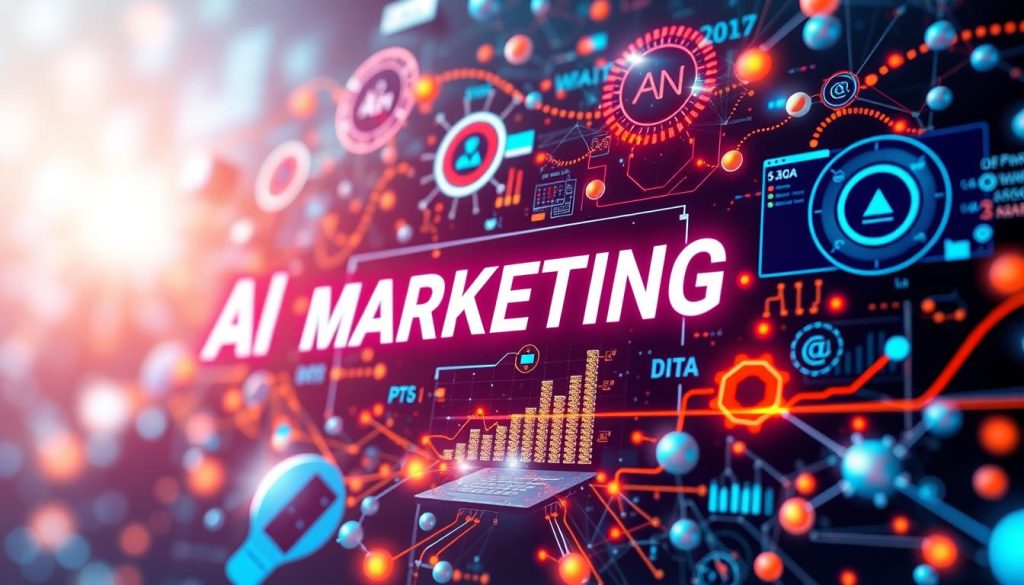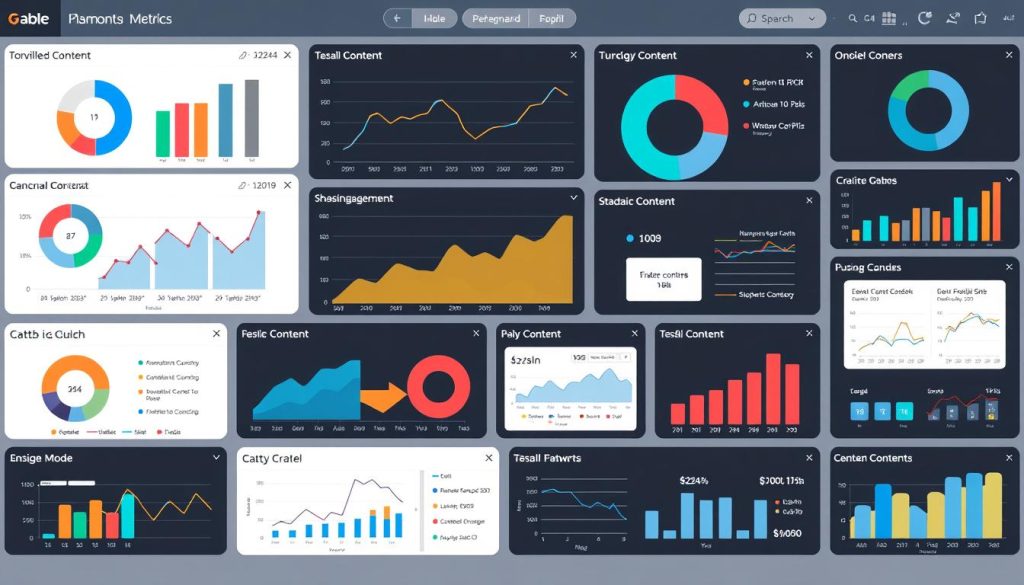As we step into 2024, the marketing landscape continues to evolve at an unprecedented pace, driven by technological advancements and shifts in consumer behavior.
For marketers looking to stay ahead, understanding these emerging trends is crucial. The convergence of artificial intelligence, visual content, and evolving social media platforms is reshaping how brands connect with their audiences.
This comprehensive guide explores the most significant trends in the industry, providing actionable insights for professionals.
Table of Contents
Key Takeaways
- Staying informed about emerging trends is vital for marketers.
- The marketing landscape is driven by technological advancements.
- Artificial intelligence is reshaping brand-audience connections.
- Visual content dominance is a key trend.
- Evolving social media platforms require adaptive strategies.
The Evolution of Digital Marketing in 2024
In 2024, digital marketing continues to transform, driven by technological advancements and shifting consumer behaviors. As a result, marketers are facing new opportunities and challenges in their efforts to engage with their target audiences effectively.
How Consumer Behavior is Reshaping Marketing Strategies
Consumer behavior has become a crucial factor in shaping marketing strategies. With 84% of respondents in a recent consumer trends survey believing that data privacy is a human right, public opinion is shifting toward having more safeguards around personal data. This shift is forcing marketers to adapt their approaches to audience targeting and measurement.
The increasing importance of data privacy is leading to the development of new strategies that prioritize consumer protection while still allowing for effective marketing.
Key Challenges Facing Marketing Professionals Today
Marketing professionals face significant challenges in navigating the evolving digital landscape. Some of the key issues include:
- Navigating evolving data privacy regulations and platform changes
- Developing new strategies for audience targeting and measurement in a cookieless world
- Creating innovative content that captures consumer attention in a crowded market
- Utilizing the right tools to manage disconnected data sources and organizational silos
- Adapting to rapidly changing platform algorithms and features
By understanding these challenges, marketing professionals can better prepare themselves for the future of digital marketing.
AI-Powered Marketing: The Game Changer
As we step into 2024, AI-powered marketing is revolutionizing the way businesses interact with their customers. The integration of AI in marketing strategies is not just a trend; it’s a game changer that is reshaping the industry.

AI Content Creation and Automation
AI is significantly impacting content creation and automation in marketing. With AI tools, marketers can now automate repetitive tasks, such as data analysis and content generation, freeing up more time for strategic planning and creative work. This automation not only increases efficiency but also enhances the customer experience by providing timely and relevant content.
AI-driven content creation tools can analyze vast amounts of data to understand what type of content resonates with the target audience, thereby improving engagement and conversion rates. By leveraging these tools, marketers can create highly personalized experiences for their customers.
Machine Learning for Customer Segmentation
Machine learning, a subset of AI, is playing a crucial role in customer segmentation. It enables marketers to analyze complex customer data sets to identify patterns and preferences that might not be apparent through traditional analysis. This allows for more accurate and nuanced customer segmentation, enabling businesses to tailor their marketing efforts more effectively.
By segmenting customers based on their behavior, preferences, and demographics, marketers can deliver targeted campaigns that resonate with each group, thereby enhancing the overall customer experience.
Personalization at Scale Through AI
One of the most significant advantages of AI in marketing is its ability to enable personalization at scale. AI tools can analyze customer data in real-time to deliver dynamic content that is tailored to individual preferences and behaviors. This level of personalization is driving higher engagement, conversion rates, and customer loyalty.
Consumers expect personalized experiences across all digital channels. By investing in dynamic content platforms like HubSpot or Marketo, brands can deliver hyper-personalized content and recommendations, meeting these expectations and staying ahead in the competitive landscape.
Visual Content Dominance in Digital Marketing Trends
Visual content is revolutionizing the way brands interact with their audience in 2024. As technology advances and consumer behavior evolves, the importance of visual elements in digital marketing strategies cannot be overstated.

Short-Form Video Marketing Strategies
Short-form videos have become a staple in digital marketing, offering a concise and engaging way to capture audience attention. Brands are leveraging platforms like TikTok and Instagram Reels to share bite-sized content that resonates with their target audience.
To maximize the impact of short-form video marketing, consider the following strategies:
- Create content that is both informative and entertaining.
- Utilize trending challenges and hashtags to increase visibility.
- Engage with your audience by responding to comments and using duets or reaction features.
Augmented Reality (AR) and Virtual Reality (VR) Applications
AR and VR technologies are transforming the digital marketing landscape by providing immersive experiences that captivate audiences. From virtual product demos to AR-powered try-on features, these technologies are enhancing customer engagement and brand recall.
To leverage AR and VR effectively, brands should focus on creating interactive and memorable experiences that add value to the customer’s journey.
Interactive Content and User Engagement
Interactive content is a powerful tool for boosting user engagement, encouraging active participation rather than passive scrolling. Formats like polls, quizzes, and configurators drive higher engagement rates and provide valuable insights into customer preferences.
By incorporating interactive elements into their marketing strategies, brands can foster a more dynamic and engaging experience for their audience.
- Interactive content formats like polls and quizzes are driving significantly higher engagement rates.
- These formats encourage active participation, increasing time spent with brand content.
- Interactive experiences provide valuable first-party data about user preferences and behaviors.
Social Media Evolution and Platform Shifts

As we navigate the ever-changing world of digital marketing, understanding the shifts in social media is crucial. The landscape continues to evolve, with platforms adapting and new ones emerging to meet changing user behaviors.
The current state of social media platforms presents both opportunities and challenges for marketers. Our latest survey data provides insights into how marketers are planning their strategies for 2025.
Facebook’s Continued Relevance for Marketers
Despite the rise of newer platforms, Facebook remains a significant channel for marketers. Its vast user base and diverse advertising options continue to make it a valuable platform for reaching target audiences.
The Rise of LinkedIn as a Content Platform
LinkedIn has emerged as a critical content hub, particularly for B2B marketers. Its professional user base makes it an ideal platform for sharing industry insights and thought leadership content.
TikTok vs Instagram Reels: Battle for Short-Form Video
The competition between TikTok and Instagram Reels continues to intensify. Marketers must choose between these two popular short-form video platforms based on their target audience and content strategy.
Threads vs X: The Microblogging Showdown
The emergence of Threads as a competitor to X (formerly Twitter) has created new opportunities for marketers. Our survey shows that 68% of marketers plan to continue or expand their investment in X in 2025, while 59% plan to do the same for Threads. The distinct advantages of each platform mean marketers are developing platform-specific strategies.
As social media continues to evolve, marketers must stay agile, adapting their strategies based on performance data and platform changes. The ability to navigate these shifts will be crucial for successful digital marketing in 2025.
Strategic Approaches to Modern Marketing
In the realm of modern marketing, staying ahead of the curve requires a deep dive into innovative strategies that drive engagement and conversion. As consumer behaviors continue to evolve, marketers must adapt by leveraging the latest trends and technologies.
Niche Influencer Marketing
Finding the right influencers is crucial for the success of your marketing campaigns. To identify niche influencers, start by defining your target audience and understanding their preferences. Utilize social media listening tools to discover influencers who are already engaging with your brand or niche.

Voice Search Optimization
With the rise of voice assistants, optimizing for voice search has become increasingly important. Focus on natural language and long-tail keywords that mirror how people speak. Ensure your website is mobile-friendly and has fast loading speeds to improve voice search rankings.
Social Commerce and Shoppable Content
The line between social media and e-commerce is blurring, with platforms like Instagram, Facebook, and Pinterest integrating in-app shopping features. To optimize for social commerce, create engaging, shoppable content that encourages sharing and streamlines the buying process.
Key strategies include using visually appealing and interactive content, product tags, in-app checkout, and AR try-on features. Social commerce platforms are transforming how consumers discover and purchase products, allowing brands to reduce friction in the customer journey.

By embracing these strategic approaches, marketers can stay ahead in the competitive digital landscape and drive meaningful connections with their target audience.
Navigating Data Privacy and Ethical Marketing
With the ever-evolving digital landscape, marketers must prioritize data privacy to build trust with consumers. The past few years have seen significant changes in data privacy regulations, from iOS changes to GDPR and Google’s plans to phase out third-party cookies, posing substantial hurdles for the marketing industry.
As a result, data privacy regulations and consumer expectations are fundamentally changing how marketers collect, store, and utilize customer information. The phasing out of third-party cookies and regulations like GDPR and CCPA have created significant challenges for traditional targeting and measurement approaches.
Forward-thinking marketers are embracing these changes as an opportunity to build more transparent, trust-based relationships with consumers. First-party data strategies are becoming increasingly important as marketers adapt to a world with fewer third-party tracking capabilities.
Ethical marketing practices that prioritize consumer privacy and consent are not just regulatory requirements but competitive advantages in building consumer trust. The balance between personalization and privacy remains a key challenge, requiring marketers to find ways to deliver relevant experiences without invasive data practices.
Brands that proactively address privacy concerns and communicate clearly about their data practices are building stronger, more resilient customer relationships. By doing so, they not only comply with regulations but also foster a loyal customer base, ultimately having a positive impact on their business.
FAQ
How can independent professionals stay ahead of the curve in terms of content creation?
By leveraging tools like AI-powered content generation and focusing on high-quality, engaging experiences that resonate with their target audience.
What role does personalization play in modern marketing strategies?
Personalization is crucial as it allows brands to tailor their messaging and offerings to specific audience segments, thereby enhancing customer experience and driving engagement.
How can marketers effectively utilize short-form video content?
Marketers can leverage short-form video by creating concise, informative, and entertaining content that captures audience attention, often through platforms like TikTok or Instagram Reels.
What are the key challenges facing marketing professionals today in terms of data privacy?
Marketing professionals must navigate complex data privacy regulations while still delivering personalized experiences, requiring a balance between data utilization and consumer privacy protection.
How can independent professionals optimize their online presence for voice search?
By focusing on natural language, long-tail keywords, and ensuring their website is mobile-friendly and loads quickly, independent professionals can improve their visibility in voice search results.
What is the significance of niche influencer marketing for brands?
Niche influencer marketing allows brands to target specific audiences through influencers who have established credibility and trust within those niches, often leading to more effective campaigns.
How can brands leverage augmented reality (AR) and virtual reality (VR) for marketing?
Brands can use AR and VR to create immersive experiences that engage customers, provide unique product demonstrations, and offer memorable brand interactions.





